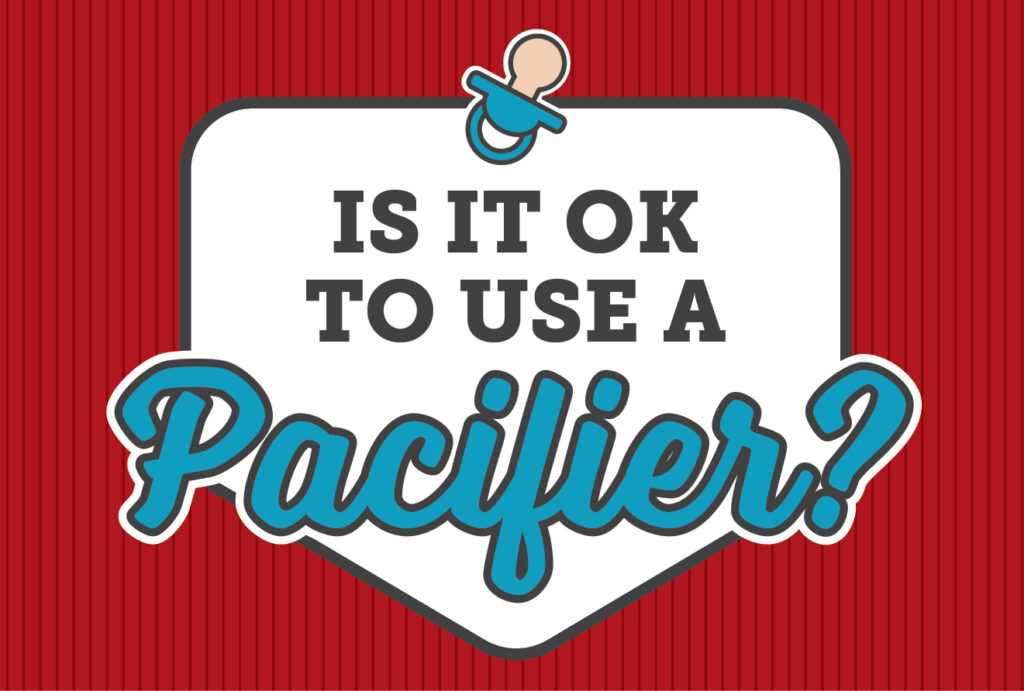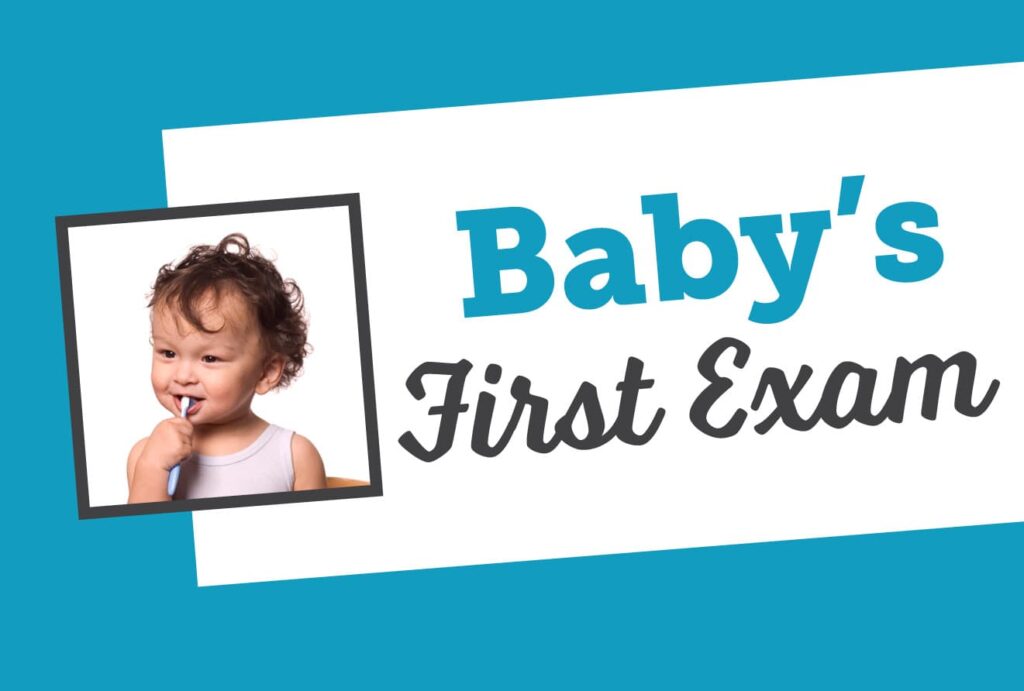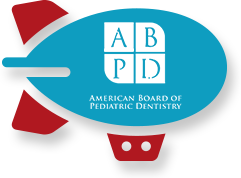August 31st, 2021

Most children often suck on fingers, thumbs, pacifiers, and other objects as a way to calm themselves. Sucking, a natural reflex, helps children feel happy and provides a sense of security, especially during stress. Because it is calming, sucking can relax a child to sleep.
Prolonged pacifier use, or thumb-sucking, can cause orthodontic problems such as open bites, crossbites, and flared front teeth. Pacifier usage is often an easier habit to break in a child. For this reason, if your child begins to develop a consistent sucking habit, we recommend that you encourage your infant away from thumbs (or fingers) and towards a pacifier.
Remember to keep pacifiers clean and sterilized often to avoid infections or bacterial growth.
What types of pacifiers are okay?
There are many types of pacifiers, but they are not all equal. Make sure you look for an orthodontic pacifier which is flattened on the bottom and rounded on top. This reduces pressure on the gums and allows the baby's tongue to move naturally. Additionally, heavier pacifiers, like those with a stuffed animal attached, tend to cause more flaring of the teeth due to the pressure from the weight.
Changing your child's habits
- Only let your child have their pacifier at bedtime or to calm them down when upset.
- Remove the pacifier from their mouth when they are playing or watching TV and gently remind your child it is for bed time. Don't let them walk around with it in their mouth.
- Often children will use a pacifier or suck their thumb while snuggling a comfort item, like a special blanket or stuffed animal. Try to limit access to the comfort item if necessary.
- Make it fun! Remember positive reinforcement is a great way to encourage kids to change their habits. Check out our free printable calendar and coloring sheets.
Click here for additional tips on how to help your child stop using a pacifier, or thumb-sucking.
Tags: Early Infant Oral Care, Infant Oral Care, Thumbsucking, Thumb Sucking, pacifiers
Posted in Infant Oral Care, Preventative Care, Thumbsucking, Toddlers, Healthy Mouths, Baby Care, Thumb Sucking | No Comments
October 21st, 2019

Trips to the dentist are an essential part of oral care, but for a child, the first time can be scary. Sitting in a chair, under a light, while a stranger pokes inside their mouth is understandably daunting.
We are often afraid of things we don’t understand, so the best way to make your child’s first trip to the dentist smooth sailing is to help them understand what to expect before they get to the office. Knowledge will make the visit more comfortable and relaxing.
Normalize visits to the dentist with books, or simply talking about it! There are many children’s books out there that help make a visit to the dentist easier! A list of books can be found here. Dr. Jennison even wrote a children's book, A Sugarbug's Delight.
We also recommend roleplaying with a pretend visit! Making the dentist fun at home will make the outing more fun when the time comes. Be sure to use positive vocabulary, avoiding words like shot and hurt. Instead, talk about a clean, strong smile. In keeping with the positive theme, be sure not to bribe your kids with a post-appointment treat. Bribery gives the idea that there is something to be nervous about. Instead, opt for surprising them with some sort of reward after the fact.
Here at our practice, because we specialize in pediatric dentistry, we too have tactics to make the appointment go easy and smooth for both you and your child! Some children are ready to sit in the dental chair at their first appointment. Others do better in a knee to knee position, where they lay on a board between a parent and the doctor. Tell your child that the team will count and shine their teeth. Thank you for trusting us to take care of your child in a specialized way.
So when should you schedule this trip? As a rule of thumb, kids should start going to the dentist by age 1 or within six months after their first tooth erupts. We’ll see you then!
Tags: Dental Care, Baby Teeth, Oral Care, Cavity Prevention, Oral Health, Early Infant Oral Care, Infant Oral Care, Pediatric Dentist, Healthy Teeth, Childrens Teeth, Kids Teeth
Posted in Uncategorized, Cavity Prevention, Oral Care, Infant Oral Care, Dental Care, Oral Health, Preventing Cavities, Baby Teeth, Preventative Care, Good Dental Habits, Dental Health, Pediatric Dentist, Oral Care for Kids, Oral Health Care, Healthy Mouths, Healthy Kids, Childrens Teeth | No Comments
May 1st, 2014

Establishing a healthy starting point for your child’s oral care start earlier than you may realize. It’s amazing how quickly time passes and how fast children grow up. We’ve put together a few guidelines to encourage you to make good dental habits a priority and to begin caring for your child’s teeth as soon as possible.
Start before teeth arrive.
First teeth generally appear around 6 months. (Don’t worry if your child is sooner or later than this. All children are different.) Gently wiping the inside of your baby’s mouth with a soft cloth after meals or during bath time will help to reduce bacteria and give emerging teeth a great start. It will also get you in the habit of caring for your child’s teeth until they are ready to take over themselves.
Begin brushing as soon as the first tooth appears.
Once the first tooth emerges, it’s time to begin brushing. We recommend a tiny smear of toothpaste on a toothbrush that’s specifically designed for infants. These usually have small brush heads and a special shape or handle that fits easily in your hand. Stick to brushing twice a day and be sure to brush both the inside and outside of each tooth surface. Flossing shouldn’t be a concern until tooth surfaces touch.
Establish a dental home early.
We encourage you to make the first visit to our practice more of a “meet and greet”. We can give you and your child a mini-tour, and introduce you to our team. It is our belief that a comfortable, caring environment is essential for a lifetime of healthy smiles. We would love to see your child when their first tooth arrives or by age one.
Keep a routine for the whole family.
Children imitate what they see their parents do. Chances are, if caring for your own teeth is a priority then you will pass those health habits along to your children. Try making brushing and flossing something that everyone in your family does as part of your regular routine.
If you haven’t been following these guidelines, it’s not too late to start! The best time to begin a lifetime of great dental habits is today. We encourage you to share this blog post with your friends and family who have young children or may be expecting. And don’t forget to call us if it’s time for a check-up!




